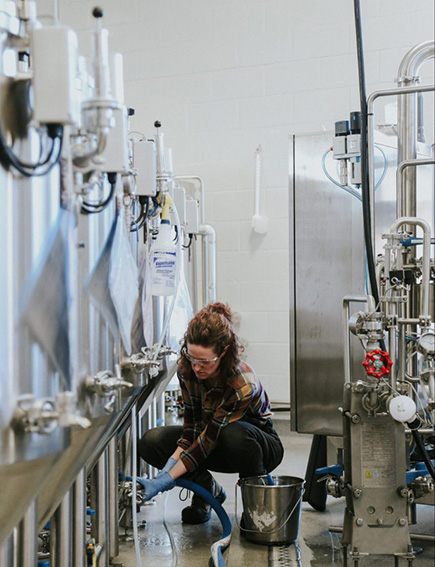By Amber Qalagari

Creating and operating a successful small business requires a passion to serve the community, a unique and trusted product or service and, of course, a thriving demand from the public. Once those are nailed down, these kinds of questions start to pop up: Will I need a permit for my business? What kind of regulations do I need to follow?
During a time when shopping local is more important than ever, we at the Department of Environmental Quality (DEQ) are here to set Utah’s small businesses up for success by helping them attain environmental compliance through our Small Business Environmental Assistance Program (SBEAP). From entrepreneurial pursuits to generational family shops, we’ll help you navigate the “must-haves” and “to-dos” to ensure our land, air, and water is safeguarded, while you do what you do best — serve the community.
You’ll Never Know Unless You Ask
Here are a few common (and not so common) questions we have received from local businesses. If you have one of your own, contact the DEQ Communications Office or you can request an appointment to go over your business one-on-one.
We are a carpet cleaning business, what do we do with the wastewater left from cleaning carpets with cleaning chemicals?
Thanks for checking in! You can dispose of the wastewater from the carpet cleaning in your bathtub or toilet. However, it does appear that you are a Very Small Quantity Generator (VSQG) for hazardous waste, which by the U.S. Environmental Protection Agency definition is when you generate less than 100 kilograms (kg) or 220 pounds per month. If you are as we suspect, you are required to do the following:
- Count the amount of hazardous wastes you produce per month. Check out EPA’s hazardous waste webpage to determine what products you use create hazardous waste and which do not.
- If you do not use all of your cleaning supplies, please take them to the household hazardous waste facility at your local landfill.
- You must comply with three basic waste management requirements to remain exempt from the full hazardous waste regulations that apply to generators of large quantities.
- Identify all hazardous waste you generate.
- You may not store more than 1,000kg (2,220lbs) of hazardous waste on site at any time.
- You must ensure delivery of your own hazardous waste to an off-site treatment or disposal facility that meets EPA requirements.
I am a local artist that is interested in trying out copper etching but I read that the used etchant (ferric chloride) becomes copper chloride, how do I find out if this is a hazardous waste? And if it is, do I need to apply for a permit?
Hazardous waste and how your business fits into the process can feel overwhelming, but hopefully, we can take away some of the confusion.
Copper chloride is a hazardous waste since it has corrosive properties. After discussing further it was determined that you create roughly 2-3 pounds of hazardous waste per month which puts you in the category of a VSQG (see above for guidelines). For your particular case, we do ask that you take that monthly waste to the household hazardous waste facility in your county. When you go to the weighing station at the landfill, let them know that you only have household hazardous waste and there will be no fee to enter. Simply drop off your small amount of waste and be on your way. Thank you for being so environmentally conscious and checking in with us to ensure you are doing your part to keep our earth safe!
We are a manufacturing facility, and added a paint booth to our plant, do we need to update our air permit?
If you are not emitting pollutants outside then we would evaluate your need for an updated air permit by determining how much paint you are using per month. Upon further review it was determined that you are using 10 gallons of paint per year, so you will not need an additional air permit. When DEQ’s Division of Air Quality comes to inspect your facility, simply let them know that you have a new paint booth added. We also advise you to fill out a Pre-Notice of Intent (Pre-Noi) to your existing permit. It will cost you approximately $200-$500 for this permitting process but will avoid any potential fines.
We are a small brewery, where should we dump our excess kegs of beer (1,984 ounces a keg, and many of them) that will not get used due to COVID- 19?
First, let me give you the directions to my house.
Joking aside, since there are no hazardous chemicals in the beer, and based on the volume of beer, your brewery would need to contact the sewage treatment plant to discharge the beer into the sewer collection system. Since the brewery is located in an approved program area, normally I would provide you the contact of the manager of the Central Valley Pretreatment Program who would approve and charge your brewery for discharging the beer.
However, DEQ’s POTW specialist can get you directly in touch with the South Davis Sewer District as their digesters are more efficient with the pH of the beer. In the end it’s a win-win, your brewery doesn’t need to pay a fine and the sewer district has happier digesters.
How Can Utah’s Small Business Environmental Assistance Program Help You?
SBEAP is a free and confidential service for all Utah businesses. We are here to help guide Utah companies on everything from pollution prevention to permit assistance. We will even provide strategies for how to use natural resources like water and energy more efficiently to help you save money. To learn more about SBEAP’s services or to set up an appointment to discuss your business questions visit sbeap.utah.gov.

I am a public information officer for the DEQ and an avid explorer and protector of our Earth. I tell stories with words, graphics, paint, ink and animations. Follow me on Instagram and Twitter at @amberqalagari.

